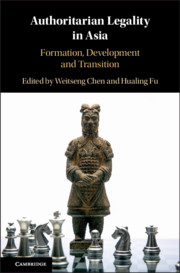Book contents
- Authoritarian Legality in Asia
- Authoritarian Legality in Asia
- Copyright page
- Contents
- Tables
- Notes on Contributors
- Acknowledgments
- Abbreviations
- Introduction Authoritarian Legality, the Rule of Law, and Democracy
- Part I Framework
- Part II Authoritarian Legality
- Part III Authoritarian Legality in Transition
- Authoritarian-Era Foundations for the Transition to Democracy
- 10 Preserving Constitutionalism by Changing the Constitution
- 11 Angels Are in the Details
- 12 Student Activism and Authoritarian Legality Transition in Taiwan
- Persistence of Authoritarian Legality after the Transition to Democracy
- Index
10 - Preserving Constitutionalism by Changing the Constitution
A Revisit and Defense of the Chng Suan Tze Period
from Authoritarian-Era Foundations for the Transition to Democracy
Published online by Cambridge University Press: 14 July 2020
- Authoritarian Legality in Asia
- Authoritarian Legality in Asia
- Copyright page
- Contents
- Tables
- Notes on Contributors
- Acknowledgments
- Abbreviations
- Introduction Authoritarian Legality, the Rule of Law, and Democracy
- Part I Framework
- Part II Authoritarian Legality
- Part III Authoritarian Legality in Transition
- Authoritarian-Era Foundations for the Transition to Democracy
- 10 Preserving Constitutionalism by Changing the Constitution
- 11 Angels Are in the Details
- 12 Student Activism and Authoritarian Legality Transition in Taiwan
- Persistence of Authoritarian Legality after the Transition to Democracy
- Index
Summary
When confronted in the late 1980s with a judicial decision that sought to expand the scope of judicial review over the Executive’s power to detain individuals without trial, the Singapore government rapidly enacted statutory and constitutional amendments that specifically overturned that judicial decision. This Chapter revisits this notorious episode and argues that the widespread criticisms levied on the reactions of the Singapore government are misplaced. As compared to sanctions against judges and direct executive interventions interferences with the judiciary by other authoritarian regimes in response to adverse judicial outcomes, the use of statutory and constitutional amendments to negate objectionable judicial decisions poses the least harm to the integrity and independence of the judicial institution. More fundamentally, the otherwise legitimate objections to authoritarianism should not distract from the fact that political mobilization to effect statutory and constitutional amendments is precisely the proper action that political actors should undertake in a liberal democracy that duly respects constitutionalism/rule of law. This Chapter argues that whether in terms of maintaining the best authoritarian rule from the perspective of authoritarian regime, or facilitating the eventual transition to the ideal of liberal democratic constitutionalism, the episode should be quietly celebrated.
Keywords
- Type
- Chapter
- Information
- Authoritarian Legality in AsiaFormation, Development and Transition, pp. 261 - 279Publisher: Cambridge University PressPrint publication year: 2020

